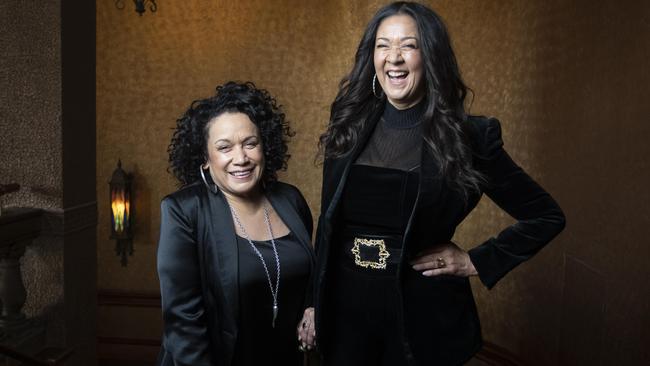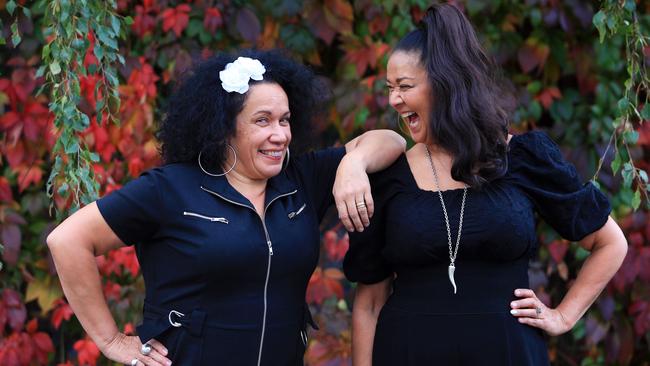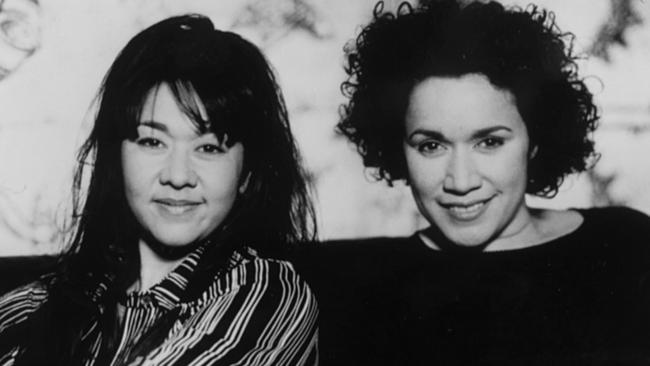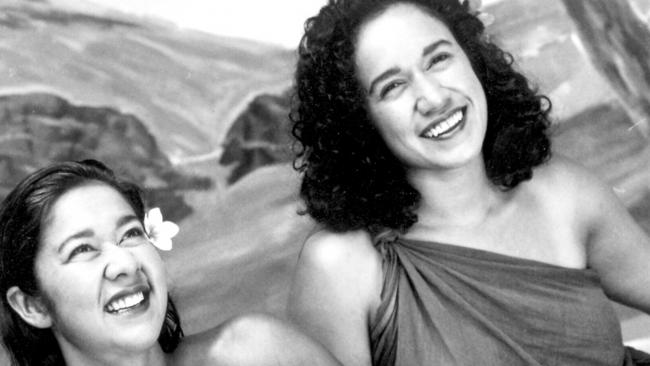Hamish McLachlan: Racist abuse made singers Vika and Linda Bull tough
The close relationship between singing sisters Vika and Linda Bull was once nearly destroyed, but their mum healed the rift with a clever, if unconventional, tactic.

News
Don't miss out on the headlines from News. Followed categories will be added to My News.
Vika and Linda Bull have been a part of the Australian music scene for decades. They emerged with The Black Sorrows, and have sung, and been heard, all around the world since. Ahead of their latest album, The Wait, we spoke about mixed marriages, racism, Michael Gudinski, left and right hooks, being terrified on stage, church music, their rift and motherly advice.
HM: Two sisters … who’s in charge when the big decisions come?
LB: She’s the older sister, so she’s the boss.
VB: But I’m the stupider one of the two. I go in there and do whatever I want, and Linda is the more cautious, the one who tidies things up once I’ve left.
HM: I’ve heard you talk about growing up, and how you felt different because your parents were in a “mixed marriage”. How common was that when you were growing up?
LB: Not common at all. They stood out, let’s put it that way. I only spoke to them about it the other day. Dad said to me the doubters thought it would never survive, but it has.
HM: It wouldn’t survive because of the perception, or the stigma at the time?
LB: They were told they were a mismatch by everyone and told it wouldn’t last.
HM: That seems so archaic now.
LB: They’ve had 56 years of marriage now, and people were ringing them on their wedding anniversary recently apologising because they thought it would never work. They are great together.
HM: Siniva, your mum, is Tongan. How did the two of them meet?
VB: They met at the Sandringham Yacht Club on a blind date. Mum was on another date, and Dad was there. They locked eyes and have not been apart since that night.
HM: They married three months later?
VB: That’s right.
LB: They were in their 30s, so they knew what they wanted. Mum was an immigrant from Tonga, so she was quite homesick and lonely. Dad was ready to meet someone too. He was working down in Gippsland. They really connected and got close quickly because they both knew they were looking for something.
VB: Mum had every intention of returning to Tonga but then she met Dad, never left, and they are still married.
HM: Siniva arrived in Australia in 1959. Was it the time when immigration to Australia was strictly limited to Europeans under the White Australia policy?
VB: That’s correct, but a lot of people were coming to Australia under the Colombo Plan. That’s how mum got to come here.

HM: What was the Colombo Plan?
VB: The government were bringing people from overseas to come and study or work — a government initiative.
LB: You needed a letter though — you couldn’t just come. That’s how she got into the country.
VB: There was a very strict White Australia policy in place too.
HM: Your mum was one of the first Tongans to settle in Melbourne, wasn’t she?
VB: She was. They all started slowly arriving thereafter, and they formed their church here. People would come to our place after church, cook, sing and talk about home. Dad loved it. He really encouraged it; he loved having a full house.
HM: Is that where you learnt and fell in love with music – at the church?
LB: It was. Mum and dad had a great record collection at home, but to hear singing like the Tongans sing in choirs, in church, in that environment, they sing for a higher reason. It was so moving, and so powerful. We’ve taken friends there and they’ve just cried. It’s just so beautiful.
VB: Mum was very musical. She had a very powerful voice in the church choir. She got us involved.
LB: We have Mum to thank, but dad is a massive music fan as well.
HM: From what I understand, your mum, on long family drives, would listen to you two singing, and critique from the front seat?
LB: Yep … she still does!
HM: Where does she do the critiquing from now?
LB: The television … the loungeroom.
VB: We’d taken our new record home for her to listen to, and she’d sit down in front of the stereo and listen very, very closely. She’d play it all day long, and then give her opinion. It’s too late, we can’t change it mum.
VB: She comes to shows, and she’s always very constructive with her feedback. She is always spot on, too.
LB: Dad’s harsher.
HM: They always are. How quickly out of school did music become something that could pay the bills?
LB: We didn’t have many jobs. It was pretty quick as the music was taking over.
VB: We quit both our jobs in our late teens and went into the music game and have never left. How lucky have we been?
HM: Very, to be able do something you love. Who was the first to say: “You two ladies have serious voices, come with us”?
VB: Joe Camilleri – but we had our own band before Joe.

HM: The Honeymooners?
VB: That’s right, and then soon after forming the band we got the call from Joe.
LB: In the very early days, it was Henry Maas who noticed us. He owned the Black Cat cafe and recognised Vika’s talent very quickly. She was singing around in clubs while I was still at school and she started to garner attention. We met Peter Luscombe, the drummer from The Black Sorrows, and he introduced us to Joe. Joe had sent him out looking for singers and he found us. Joe fast tracked our career – we could have been singing in pubs for years and years to get to where we ended up.
HM: The Black Sorrows took you from your loungeroom into pretty much everyone else’s. It was all so sudden.
VB: Very sudden. It changed overnight. We were being played on the TV, on the radio — everything just completely changed.
LB: And we had no idea about the reach we two girls could have. We were totally unprepared for that.
HM: Wasn’t it originally supposed to be a six-week tour? How long did it last?
VB: Six years. We were working six nights a week for two or three years, constantly touring.
LB: It was the tour that never ended.
VB: And it was really good fun.

HM: When did you run into singing legend Venetta Fields?
LB: Straight away, when we joined the Sorrows. What a singer. She had done it all, and helped us so much. She had recorded and toured with the Rolling Stones, Aretha Franklin, Ike and Tina Turner, John Farnham, … you name it. She was so special to us.
VB: She taught us a lot.
HM: What did she teach you?
LB: Really how to work in the studio. We had no idea … Hold On To Me was our first album. She stood in the middle of us, separated us and told us what to do with her hands. “Stop”. “Keep going”. “Hold your notes”. She’d match our vibrato, and so many tricks we use today, she taught us so many little things we should have known but didn’t, and lots of things we would never have found out in a lifetime of music.
HM: The Sorrows introduced you to a new world, and it wasn’t just about making music, but also the business of music.
VB: It did. Joe was always shrewd – a cunning, clever operator.
LB: He was the one that told us what to look out for in a recording contract. He told us: “If there is anything you should hold out for, it’s your copyright. Retain your copyright, and you’ll be fine.” It was incredibly tough and a hard thing to do. It was unheard of then. We had our first record company meeting with Sony, we sat in there and listened, and the advice that he gave us allowed us to gain our copyright. We still have it now.
HM: When you started, was it a male-dominated environment?
LB: It was. It was full on, but we stuck together. We knew we had each other, so we could survive on the road, but we got used to being the only females around. There weren’t many females on the bill, there weren’t many females in the crew, backstage – anywhere.
VB: We had a bunch of fellas in the band who were very protective of us, so we were lucky. We were never exploited in any way or anything like that, they really looked after us.
VB: We ended up signing with Mushroom, and it was a completely different scene. A lot of women were working behind the scenes and Michael Gudinski and Warren Costello really looked after us.
HM: How much did you have to do with Michael over the journey? He was such an enormous figure in the industry.
LB: Early days, he allowed us to attain our copyright and we trusted him with that. He was instrumental in the early days in building our careers in our own way, not just as backing singers but with our own voices. He was very important to us. That’s why this chapter is sad, but happy, because we are back with him in a way.
VB: When lockdown started, he did so much for our industry. We released a couple of albums last year which were quite successful and started building up our relationship with him again.
LB: To see that baton handed over and held by someone so beautiful, like Matt, taking charge with the rest of them. They just treat us well, we know we are safe.

HM: I read that when you were younger, you were having to go into side doors because of the racism that existed. Everyone was so ignorant. Is that right?
VB: We copped our fair share. There was one pub that we played at, we were staying at the hotel, and we had to walk in the front door to get through. They wouldn’t let us into the club because we were Tongan. They didn’t believe we were in the band, even though the posters were on the wall with our faces on them. We’ve been spat on. We’ve had our fair share of that sort of behaviour growing up – it’s made us tougher. You learn how to fight back.
HM: Was it you, Vika, that punched a kid and put him in sick bay with a broken nose?
VB: Yep.
HM: Left or right?
VB: Right. He was being mean to Linda. I was only seven-years-old.
LB: Mum always said: “If you ever run into trouble, run across the hall and tell Vik.” That’s what the instructions were … so I did. I didn’t think she’d do that, but he deserved it … I probably shouldn’t say that. But he did.
HM: What’s the greatest misconception about the rock ’n’ roll lifestyle?
LB: That it’s glamorous.
VB: All the things that you think, they are all there.
HM: “Sex, drugs and rock ’n’ roll”, as they say?
VB: Bloody oath!
LB: Tick, tick, tick, but people assume that you’re wealthy, and some people are, but we just work like everybody else.
HM: I read that you both had a rift that nearly ended your relationship as sisters. How did you fall apart — and piece it all back together?
LB: Our mother was instrumental in getting us back together. She locked us in a room and said: “Don’t come out until you’ve made up.” It fell apart because my husband was the manager and our relationship was interfered with. Vik and I have always been close, since we were babies, and he made it difficult, to the point where we couldn’t work together. We stopped for a while.
VB: That’s exactly right. I bottled it up and had a few too many drinks one night and let them know exactly what I thought. She didn’t talk to me for two months, and I was heartbroken. I wish we talked it through, rather than me going wild and being ridiculous. You have those moments in families, don’t you?
LB: It was difficult for me because I was stuck in the middle. Vik was completely valid — it was just the way she delivered the message …
VB: I could have been more sensitive in my delivery.
HM: And in terms of getting back on track, was it months later, or years?
LB: A few months. We were quite happy to be talking again to be honest … neither of us liked being away from each other.
HM: What has the lockdown taught you about yourselves?
VB: Don’t take life for granted.
LB: Generations that have gone before us have gone through hardship, in one way or another. Something has happened in their generation that they remember. This is going to be something that we will remember for the rest of our lives. We need to not take our freedoms for granted and enjoy the freedoms we do have.
VB: Life can change in an instant.

HM: What about the album? First original songs in 19 years. Is it called The Wait because it’s been exactly that?
LB: That’s right.
VB: We’ve released plenty of other stuff, but our own, original material, it has taken a long time. Our manager said to us, “what about The Wait (as a title)?” The perfect title!
LB: We’ve waited for so many reasons. Given the stop-start nature of the last two years, we waited until we had something to say. Vik and I were always working with other people and singing as a support role too while they were singing their songs. We were waiting, watching, for other people to do their thing and have their creative output. You must be patient.
HM: What’s the theme of the album?
VB: There’s a few. “I’m not going to take s —t”, “I’m tough”, but there are songs on there where the theme is “we are vulnerable” as well”. We’ve come to an age where you can be in and out of love, and I’m not tough all the time, even though I can be. Sometimes I don’t want to be.
LB: There’s an undercurrent theme in the record of stepping out of our shadow, into the light and being able to survive.
HM: Sounds great. The most impressive musician you’ve met?
VB: Iggy Pop probably. Jimmy Barnes – bloody hell … he’s a powerhouse. Archie Roach, Paul Kelly. There are so many wonderful musicians, and not just the leads. People like Peter Luscombe, Ash Naylor on guitar. There are so many impressive people that we have been lucky to work with and meet. They are all beautiful human beings.
LB: Archie and Jimmy both had incredibly tough starts. What they have done, and how they have overcome it, that’s what makes them impressive. I don’t think I could divide those two. They are impressive in the way they have succeeded against all the odds.
HM: What’s the best gig you have ever played at?
LB: Grandma very rarely came to see us sing, but when we were in Tonga, she came along to a show. We were singing a song about her husband, our grandfather, and that was a special moment. That was as good as it gets for me.
HM: Where was that?
VB: In a school in Tonga. We’ve had so many great gigs, though, but for me the smaller ones are my favourites. They are so intimate.
LB: Those rough pub gigs where people go crazy. The Corner Hotel, where people are close and can see you. It’s brutal, but good.
VB: That’s how we grew up – pub rock. We feel right at home in that situation.
LB: We don’t care (if) people are blowing smoke in our face. That’s great, that’s the excitement of it. The bigger gigs, where people are distanced from you, they’re weirder.
HM: How does singing in front of 100,000 at the home of football rank in terms of career moments?
VB: That was the most frightening experience ever.
HM: Why? Do you still get nervous and scared?
VB: Of course! When you have a whole band on stage with you, you feel safe, but when you’re standing in the middle of the MCG with 100,000 people and just your sister beside you — that was just the worst.
LB: We held hands on to the ground. We were standing under the holding bay, and we had a minute to listen to the crowd. I said to Vik, “we need to enjoy this, otherwise we’ll just s —t ourselves”. We walked out, looked at the crowd, took a moment, and said, “we’ve got this”. We held each other’s hands and did it.
VB: When we stood out there in the middle of the MCG, I thought to myself, “why on earth did we agree to do this? And why did we agree to do it a cappella! We could have done it with music. Are we nuts?”
LB: That was your decision …
VB: It was. If we stuff this up, everyone will start throwing their meat pies at us. That’s all I pictured in my head. We couldn’t fail – that wasn’t an option.
Vika and Linda Bull’s new album, The Wait, is out Friday, September 17.
Touring nationally in November.
More Coverage
Originally published as Hamish McLachlan: Racist abuse made singers Vika and Linda Bull tough




